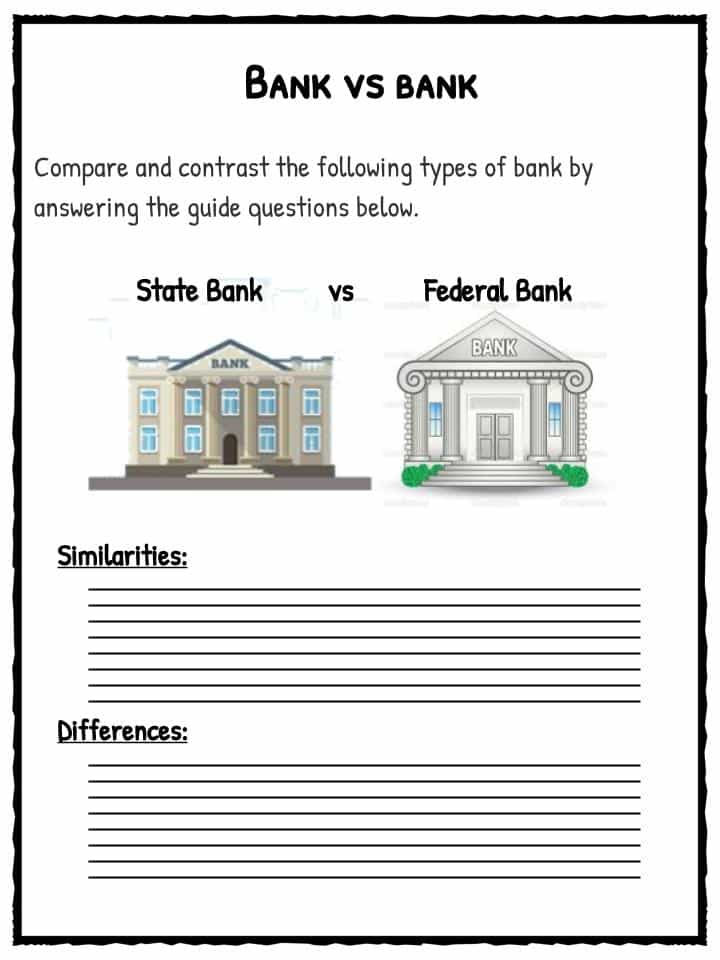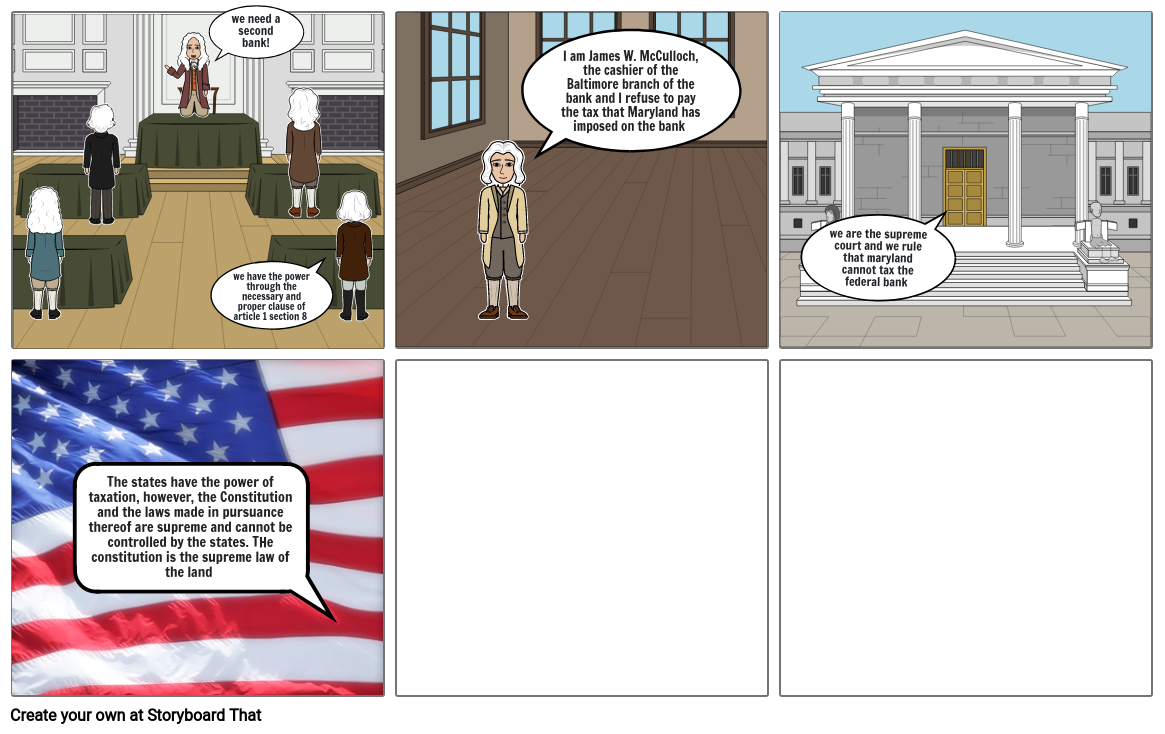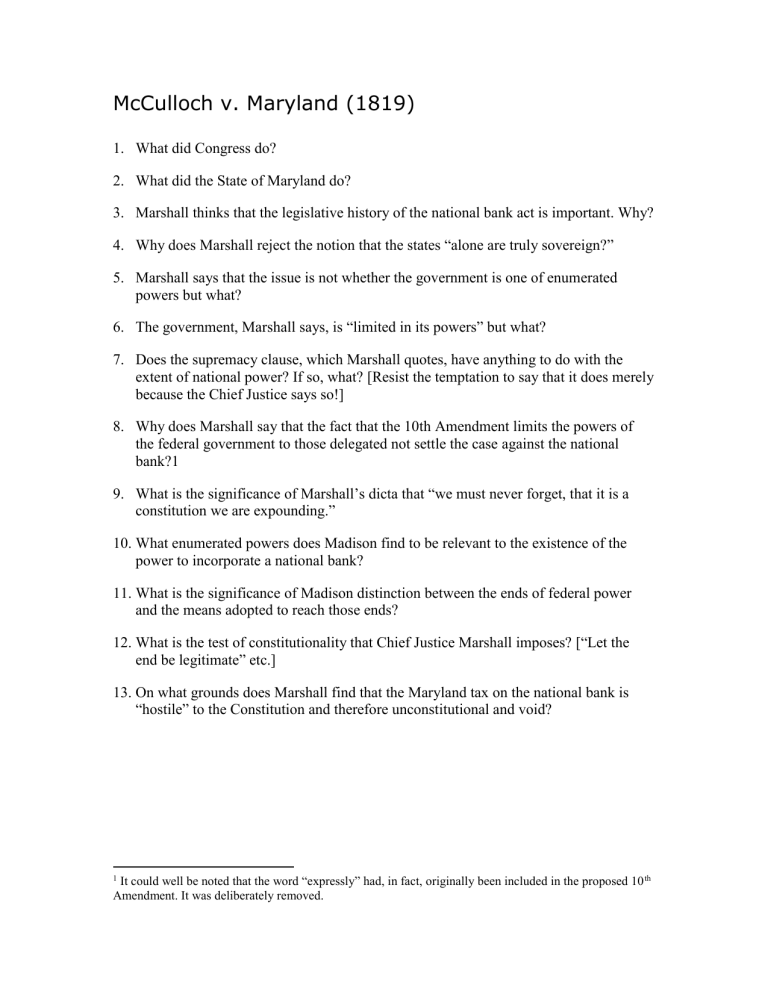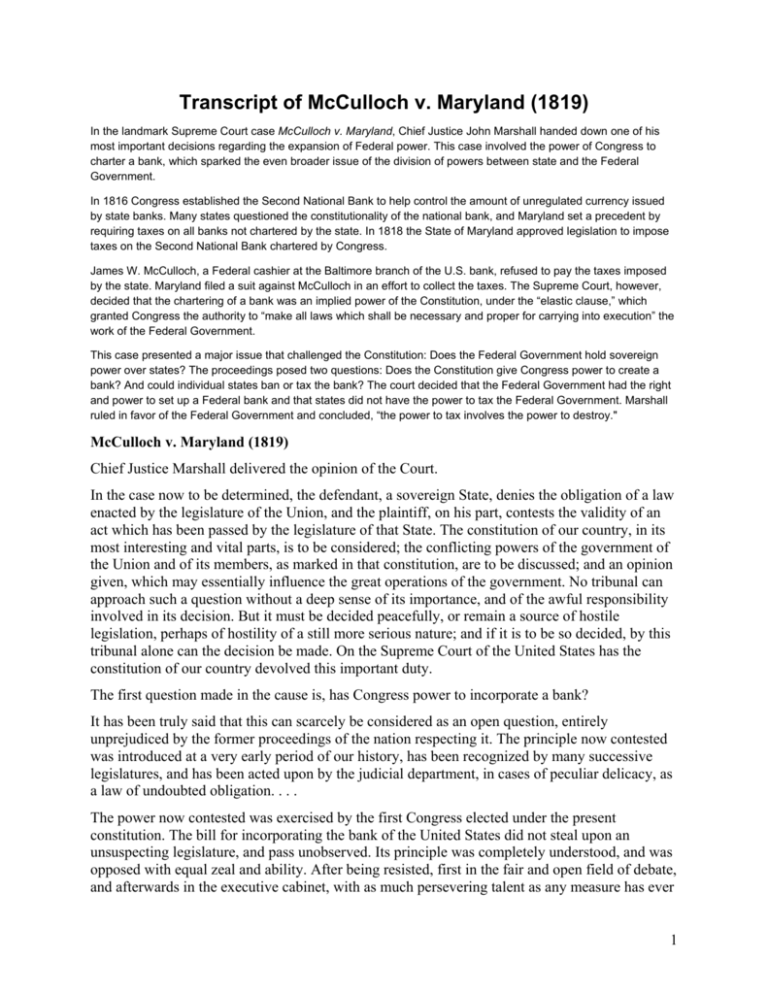Mcculloch V Maryland Worksheet
Mcculloch V Maryland Worksheet - Maryland (1819) case background and primary source documents concerning the supreme court case of mcculloch v. Maryland questions and answers who were the major players in the case? The court’s judges said that congress has “implied powers” in addition to the powers stated in the constitution. Mcculloch was then sued in state courts and lost, so he appealed to the us supreme court with daniel webster as his attorney. Maryland below and answer the questions that follow. Web start free trial questions & answers mcculloch v. Supreme court case decided in 1819, in which chief justice john marshall affirmed the constitutional doctrine of congress’ “ implied powers.” it determined that congress had not only the powers expressly conferred upon it by the constitution but also all authority “appropriate” to carry out such powers. Web mcculloch took his case to the united states supreme court. Web when maryland imposed a tax on the baltimore branch of the bank, james mcculloch—who worked at the branch—refused to pay the tax on the ground that maryland had no authority to levy it. 20 by 11:59 pm directions: Web the state of maryland imposed a tax of $15,000/year on the national bank, which cashier james mcculloch of the baltimore branch refused to pay. Maryland argued that as a sovereign state, it had the power to tax any business within its borders. Web james mcculloch, a branch employee, refused to pay the tax. Compare this $5 bank note from. Topics you'll need to know to excel in the quiz include john marshall and the state of. The court ruled in favor of mcculloch on march 6, 1819. Compare this $5 bank note from the 1800s with a $5 bill you might have in your pocket right now. Maryland below and answer the questions that follow. The court’s judges said. Maryland is what you'll find on this quiz and worksheet combo. Maryland was a landmark supreme court case from 1819. Supreme court case decided in 1819, in which chief justice john marshall affirmed the constitutional doctrine of congress’ “ implied powers.” it determined that congress had not only the powers expressly conferred upon it by the constitution but also all. Did the fourteenth amendment apply the constitution to the state in. Keep in mind the key questions in the case (set out below). One way to use transitions is after a period, at the beginning of the next sentence. Web when maryland imposed a tax on the baltimore branch of the bank, james mcculloch—who worked at the branch—refused to pay. Mcculloch was convicted and fined, but he appealed the decision. Maryland was a case heard by the supreme court of the united states in 1819. Dealing with the constitution's necessary and proper clause, this lesson asks students. 20 by 11:59 pm directions: Students will asked to assess the role of the elastic clause in shaping the role of the federal. Web mcculloch took his case to the united states supreme court. Maryland argued that as a sovereign state, it had the power to tax any business within its borders. You'll be asked about the name of the justice who wrote the decision and why the case came. It was one of the most important cases in relation to federal (us. Students should be introduced to the following cases prior to attempting this assignment: Students will asked to assess the role of the elastic clause in shaping the role of the federal government. Streamlined for easy instructional use, each puzzle worksheet in this set — even the word jumble — comes with a convenient teacher answer key for. Compare this $5. List five similarities and five differences. 316 (1819) states cannot interfere with the federal government when it uses its implied powers under the necessary and proper clause to further its express constitutional powers. The court’s judges said that congress has “implied powers” in addition to the powers stated in the constitution. Dealing with the constitution's necessary and proper clause, this. Questions before the supreme court: One way to use transitions is after a period, at the beginning of the next sentence. Maryland was a landmark supreme court case from 1819. The state of maryland sued mcculloch saying that maryland had the power to tax any business in its state and that the constitution does not give congress the power to. 316 (1819) states cannot interfere with the federal government when it uses its implied powers under the necessary and proper clause to further its express constitutional powers. Mcculloch was then sued in state courts and lost, so he appealed to the us supreme court with daniel webster as his attorney. Web when maryland imposed a tax on the baltimore branch. Mcculloch was convicted and fined, but he appealed the decision. Maryland worksheet 10 points (90% category) due: 316 (1819) states cannot interfere with the federal government when it uses its implied powers under the necessary and proper clause to further its express constitutional powers. One way to use transitions is after a period, at the beginning of the next sentence. 20 by 11:59 pm directions: It was one of the most important cases in relation to federal (us government) power. Maryland, the court said that “necessary and proper” means Web start free trial questions & answers mcculloch v. Web the following quiz and worksheet combo will display your knowledge of the case mcculloch v. This purchase includes a creative cloze notes template, reading worksheet and link to a video clip. Transition words can link two sentences together so they read smoothly. Web james mcculloch, a branch employee, refused to pay the tax. The court’s judges said that congress has “implied powers” in addition to the powers stated in the constitution. The court ruled in favor of mcculloch on march 6, 1819. Students learn about the landmark case mcculloch v. Dealing with the constitution's necessary and proper clause, this lesson asks students. Questions before the supreme court: The case went to the supreme court. Maryland questions and answers who were the major players in the case? Streamlined for easy instructional use, each puzzle worksheet in this set — even the word jumble — comes with a convenient teacher answer key for. Students should be introduced to the following cases prior to attempting this assignment: Web the supreme court case of mcculloch v. Keep in mind the key questions in the case (set out below). Questions before the supreme court: Compare this $5 bank note from the 1800s with a $5 bill you might have in your pocket right now. For instance, the power to. Topics you'll need to know to excel in the quiz include john marshall and the state of. Maryland below and answer the questions that follow. Web start free trial questions & answers mcculloch v. List five similarities and five differences. Students learn about the landmark case mcculloch v. Web this set of word search, secret code and word scramble worksheet printables features phrases and terms relating to the united states supreme court’s landmark decision of mcculloch v. Web in the case mcculloch v. Mcculloch was then sued in state courts and lost, so he appealed to the us supreme court with daniel webster as his attorney. Mcculloch was convicted and fined, but he appealed the decision. The court’s ruling asserted national supremacy over state authority.McCulloch v. Maryland Facts, Information & Worksheets For Kids
Mcculloch Vs Maryland Worksheet
McCulloch v. Maryland Facts, Information & Worksheets For Kids
McCulloch v. Maryland Quiz & Worksheet for Kids
McCulloch v. Maryland Storyboard by 2658b363
McCulloch v. Maryland (1819)
Transcript of McCulloch v. Maryland (1819)
Maryland Puzzles WordMint
Mcculloch V Maryland Worksheet Answers Kayra Excel
McCulloch vs. Maryland Jordan and Courtney Crossword WordMint
Supreme Court Case Decided In 1819, In Which Chief Justice John Marshall Affirmed The Constitutional Doctrine Of Congress’ “ Implied Powers.” It Determined That Congress Had Not Only The Powers Expressly Conferred Upon It By The Constitution But Also All Authority “Appropriate” To Carry Out Such Powers.
Web The Following Quiz And Worksheet Combo Will Display Your Knowledge Of The Case Mcculloch V.
Maryland Questions And Answers Who Were The Major Players In The Case?
Did The Fourteenth Amendment Apply The Constitution To The State In.
Related Post:










